... STAGEMATRIX updates
Go.dot'06
books.filmplus.org
filmplus.org/classes
directing.filmplus.org
pomo.vtheatre.net & filmplus.org/vtheatre
|
2008 -- picasa pix/links as guides [ R/G are Dead ]
... STAGEMATRIX updates Go.dot'06 books.filmplus.org filmplus.org/classes directing.filmplus.org pomo.vtheatre.net & filmplus.org/vtheatre
|
|
... Directing is simple; you have to take care what you got -- script (characters, plot, themes), actors (characters, plot, themes), stage (characters, plot, themes), costumes....
[ advertising space : webmaster ] text LINKS 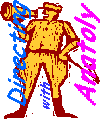 Theatre w/Anatoly, Directing: Spring 2002 Class Featured Pages: BioMechanics: New Directory! For 2005: Pygmalion DVD * Play * My Fair Lady (script) * My Fair Lady DVD * Plays by Shaw * Sayings of George Bernard Shaw * NEW : * NEW: goto.txt : AFTER 2009 : LUL pages : teatr.us Go.dot 2006 * * 100 years since Sam Beckett's birth * flickr.com/groups/stage * 2007 : the art of theatre [flickr] * 2008 : Stoppard *  DJ XXI  SummaryRead Director page and use the links (htmlgears); I throw them in, because I have no time to organize the texts into a narrative. Sorry. NotesUse shows.vtheatre.net CaseStudy pages The Possessed 2003 UAF Fall 2005: Small Chekhov Approaches to Directing * some history: The beginning of modern directing is commonly associated with the Meiningen Players, a German acting troupe organized in 1874 by George II, duke of Saxe-Meiningen. Under the direction of Ludwig Chronegk, the group worked as a unit, setting an influential example of effective ensemble playing. Leading realistic directors of the late 19th cent. included André Antoine in France, Otto Brahm in Germany, and Constantin Stanislavsky in Russia. The most innovative of these was probably Stanislavsky, who stressed ensemble acting and the importance of actors' absolute identification with their roles. Almost as soon as realism gained ascendancy, various antirealistic theatrical movements developed, beginning with Paul Fort's Théâtre d'Art (1890). The theories of Adolphe Appia in Germany and Edward Gordon Craig in England encouraged European directors to experiment with symbolic settings. Even conservative directors such as Harley Granville-Barker and Jacques Copeau soon realized that a realistic setting was not essential to the true rendering of a play's meaning. In addition to producing increased artistic possibilities for directors, the rise of antirealism made the director's practical task of coordinating scene design, lighting, and acting even more essential. A director who experimented successfully with both realism and antirealism was the German Max Reinhardt. Noted for his extravagant productions, he tried to remove the barrier between actors and audience by projecting the stage into the audience and scattering actors among the spectators. During the 1920s there were several important antirealist directors working in Germany and the Soviet Union, notably Vsevolod Meyerhold, Alexander Tairov, and Erwin Piscator. A disciple of Reinhardt, Piscator worked with the playwright Bertolt Brecht, whose theories have greatly influenced 20th-century theater. In order to emphasize the social and intellectual content of Brecht's plays, Piscator utilized stylized settings and mechanical devices such as motion pictures. Brecht wished to insure the intellectual receptiveness of his audience by making it continually aware that it was watching a play, not reality. To this end he and Piscator took the opposite of the Stanislavsky technique and schooled their actors to alienate themselves from their roles. During the 19th and early 20th cent., the American theater was dominated by directors specializing in elaborate surface realism, with David Belasco as their prototype. A break from that tendency was made by the Group Theatre (1931–41), with Cheryl Crawford, Lee Strasberg, and Harold Clurman directing plays of social significance and promulgating Stanislavsky's theories of acting. Strasberg's Actors' Studio has produced several generations of theater and film actors devoted to the Stanislavsky technique. Enormous emotional expressiveness was also elicited by José Quintero in his direction of actors at New York's Circle in the Square and in Poland by Jerzy Grotowski in his sparely experimental productions at Wroc³aw's Polish Laboratory Theatre. During the 1950s and 60s the emergence of the theater of the absurd and the theater of cruelty granted directors more scope than ever. Many directors, among them Peter Brook, began incorporating music, acrobatics, dance, film, and mime into their productions, whether the plays being performed were by Beckett, Stoppard, or Shakespeare. Theatrical happenings and the orgiastic productions of Julian Beck's Living Theater—replete with audience participation—may be viewed either as giving the director unlimited freedom or as eliminating his function altogether. The director was commonly of prime importance in the theatrical productions of the late 20th cent. In the Brooks tradition, a number of directors, including America's Peter Sellars, Germany's Peter Stein, France's Ariane Mnouchine, and Poland's Tadeusz Kantor, put their individual and innovative creative stamps on classical and contemporary works. A wide range of approaches and preoccupations characterized late 20th-century directors, including the social concerns of such figures as Brazil's Augusto Boal and Russia's Lev Dodin; the experimentalism of such writer-directors as America's Robert Wilson and Maria Irene Fornes, Canada's Robert Lepage, and Japan's Shuji Terayama; and the varied techniques of such other prominent directors as Jonathan Miller (Great Britain), Yukio Ninagawa (Japan), Lluís Pasqual (Spain), and Julie Taymore (United States). Directors on Directing: A Source Book of the Modern Theater by Helen Krich Chinoy, Toby Cole; Bobbs-Merrill, 1963 : - 1: The Emergence of the Director - 2: Vision and Method - 3: The Director at Work A Formalist Theatre by Michael Kirby; University of Pennsylvania Press, 1987 : - Part One Formalist Analysis - Chapter One Acting and Not-Acting - Chapter Two the Structure of Performance - Chapter Three Referential and Nonreferential Theatre - Chapter Four Style as Perceptual State - Part Two the Social Context - Chapter Five the Critical Screen - Chapter Seven Avant-Garde Theatre - Part Three Structuralist Theatre - Chapter 9 Three Structuralist Performances - Chapter Ten Structuralist Film * Theatre Director: The director, as a position in and of itself, is a relatively new innovation in the history of theatre, with the first examples appearing in the late 1800s and widespread popularity only being achieved in the early part of the 20th century. Prior to that, it seems that actors or the playwright were responsible for presenting the show and coordinating efforts. Though some individual productions and groups still operate without a specified director, the director is now considered a vital figure in the creation of a theatrical performance. Styles of directing [ ] Stage Director's Handbook 2nd Revised Edition: Opportunities for Directors and Choreographers * The second edition, completely revised and updated, of the comprehensive guide for theatre directors and choreographers brings together valuable information about organizations and opportunities available for theatre artists at any stage of their career. Chapters include training programs, grants and fellowships, service organizations, agents, theatres, working abroad and producing your own work. 2006: vTheatre -- POMO project (Pinter + Mamet) Total Directing (a crazy idea to combine theatre and film directing), but "total" means to be in the mind of a director, to feel and think like one, to live as a director (artist). If I will have time... 2006: a lot of service or "support pages" (bottom) -- appendix, bibliography, links, new, and etc. (the pages which are always "under construction"). anatoly.org (another attempt to get organized). * I beagn to use russian texts, but now they will be in Russian-American Theatre (RAT Russian) directory. [ Cyrillic (window), if you read Russian. ] Next page: director
...
|
images from picasaweb.google.com/anatoly.antohin:
also, see http://picasaweb.google.com/anatoly.antohin/ACTING
http://picasaweb.google.com/anatoly.antohin/EpicTheatre
http://picasaweb.google.com/anatoly.antohin/Chekhov
http://picasaweb.google.com/anatoly.antohin/Playwrights
...
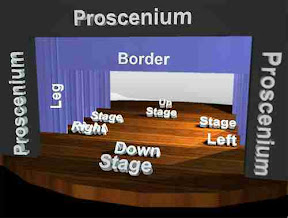 |
| From stage directing |
Something new: METHOD ACTING for DIRECTORS @ virtual theatreFirst Direct Page @ Theatre w/Anatoly and Directing Directory. Most of the webpage are instructional (classes), but many do have texts on Directing Theory and Theatre Theory. I'm making the specialized glossary for each directory, but this job will take forever to be done (year or two). I gave a title for Directing Pages "StageMatrix" (or "StageMetrics"), following the intentions of Meyerhold.
Since Director is in the middle of everything, you better read SCRIPT directory and ACTING directory (actually, both -- System of the Method and Biomechanics).
plays
Examine all and every line of communication/expression. Notice that I position director in immediate contact with the public. SHOW must be seen as a text, where every other texts (script, performance, set costumes and so on) could be view as pre-texts. [ Perhaps, the spectator's experience of the show could be call "final" text. ]
*
actors * director * designers
*
publicdirector -- public
could be presented as a formula:directing = acting + design + script
Which element is more important? "Poor Theatre" version:directing = acting + script
No matter how I envision the director's relationships with the public, actors do come first, not the script.There in direct.vtheatre.net (Fundamentals of Directing class) I have four main parts: directing script, directing actors, directing space and time, and, finaly, the result of ALL directions -- directing spectator (mind, imagination, heart.... where the real action takes place!)
[ see 3texts for details. ]
If you are interested in Virtual Theatre applications to live shows, I teach vTheatre Special Topics class in the Spring 2001 and you can subscribe to vTheatre Forum.
There are still many "directing" files I have on my hard drive and most likely I can webpublish them only, when I am about to teach next directing class.
Follow THR331 Fundamentals of Direction, if you are a novice director.
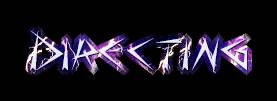
I leave this situation with a thought that each actor has to learn how to be his or her own couch and trainer. It does take skill of self-evaluation, critical observation, living a separate non-actor's existance. One tool I always adviocate -- Actor's Journals (you it from your classes). You have to record your state of mind, your progress, your goals -- you have to talk to yourself!
Another -- developing a little director sitting inside you with his voice and his talk. It takes a journey into other lands -- general understanding of the script ourtside of your role, understanding designers, even the ideas behind the lighting plot. Yes, it will help you to remember the laws of the acting areas. You will remember that once established your positions can't be change -- and you better be sure that you are where you want your character to be.
Directors love actors who meet them half way; we are digging the channel from two opposite sides, friends. We have to develp macro-action (director) which coincides with the micro-actions (actor). Actor has to welcome the limitations imposed by the text, directions, design, etc -- only than you have YOUR ACTOR's SPACE for development of your role. Do you know where this space starts and ends?
Consider the reverse order; think that spectator directs you -- and you only the tool in directing of the other components of the show (form of the dramatic experience).


|
Stage Director:
The role of stage director did not appear in the history of theatre until the end of 19th century, mainly with Craig, Appia and Antoine. The role then took on an independence and individuality so that it could be considered a function in its own right. The stage director takes responsibility for the aesthetic and organising aspects of producing a play, by choosing the actors, directing their acting, and making use of the various theatrical possibilities. A director may also be an actor, author, director of a company of actors or director of a theatre. 
I do not have "history pages" (directing), but plenty of references to it. [ Theatre vs. Drama ] DIRECTOR [wikipedia] + History of theater Contents = 1 Western Theatre History 1.1 Ancient Greek theatre 1.2 Roman theater 1.3 Theatre in the Middle Ages 1.4 Commedia dell'Arte 1.5 Renaissance theatre 1.6 Neoclassical Theatre 1.7 Nineteenth Century Theatre 1.8 Twentieth Century Theatre 2 Asian Theater History 2.1 Japanese Theater 2.1.1 Noh 2.1.2 Bunraku 2.1.3 Kabuki 2.2 Chinese Theatre [ hyperlinks ] [ History of Literature ] [ ref: Wilson, Edwin. Goldfarb, Alvin. Theater: The Lively Art. Publisher: McGraw-Hill; 4 edition (June 21, 2001). ISBN 0072462817 ] Pre-history (Ritual, Shaman) Christianity, Church (Theology and Theatre) Globe (Shakespeare) 20 century (Director's Age) Twentieth-Century Theatre: A Sourcebook by Richard Drain; Routledge, 1995 - Part I: The Modernist Dimension
Epic Theatre (Brecht MAT (Stanislavsky) Non-Western China Japan (Noh, Kabuki) Java Tibet Bunraku Periodization in script.vtheatre.net [ updates, links -- pix & descriptions: banraku, butoh... ] "Experimental Theatre" (?) The Future of Ritual: Writings on Culture and Performance by Richard Schechner; Routledge, 1995 + Performance Theory by Richard Schechner; Routledge, 1988 The Director and the Stage: From Naturalism to Grotowski by Edward Braun; Holmes & Meier, 1982
|






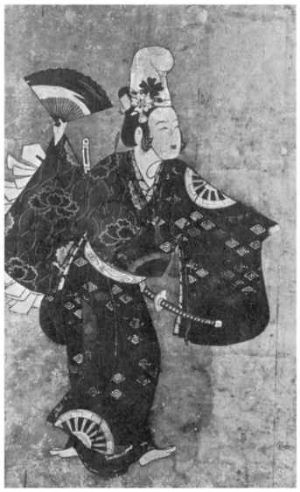


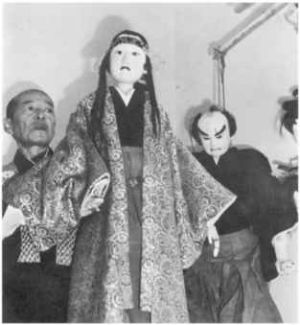
[ images ]
google.com/group/directing [2007-2008]



 Film-North * Anatoly Antohin * eCitations
Film-North * Anatoly Antohin * eCitations
© 2005 by vtheatre.net. Permission to link to this site is granted. books.google.com + scholar.google.com
cite: anatoly antohin. URL + date [ my shows : 1. writer * 2. director * 3. dramaturg * 4. actor ]
vTheatre: pomo project'06 * my yahoo: theatre
![]()